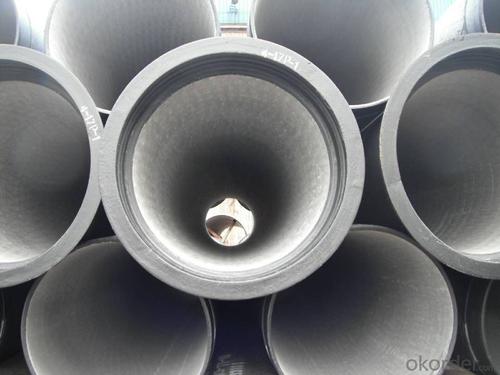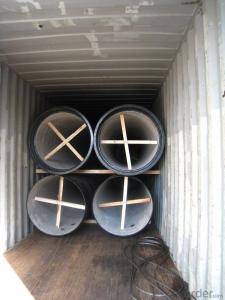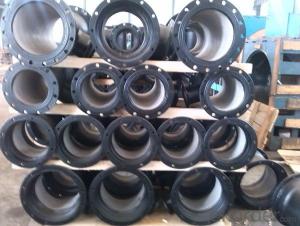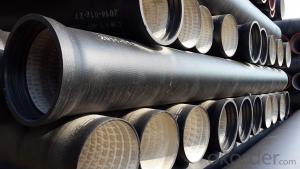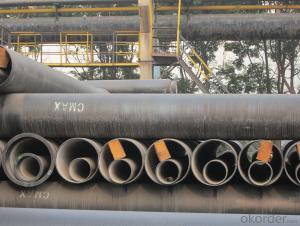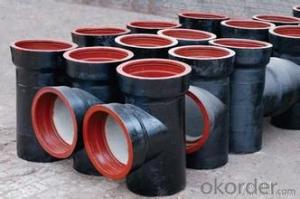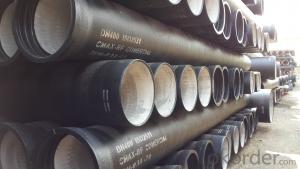DUCTILE IRON PIPE DN1000
- Loading Port:
- China Main Port
- Payment Terms:
- TT OR LC
- Min Order Qty:
- -
- Supply Capability:
- -
OKorder Service Pledge
OKorder Financial Service
You Might Also Like
Specification:
1) The standard of pipe: ISO2531:1998, K9
2) Effective length: 6m
3) Inner cement line: Portland cement line as per ISO4179
4) Zinc coating: at least 130g/m2 as per ISO8179
5) Bitumen painting: at least 70um as per ISO8179
6) With 100% quantity of NBR ring, or SBR ring, or EPDM ring as per ISO4633
7) DN80mm-800mm
8) High strength, lighter than grey iron, good corrosion resistance, no furring, small flow resistance, easy fixing, long life tome about 100 yeas
9) Produced by Hangzhou chunfeng machine
10) Checked by automatic inspection equipment
11) Composition:
Chemical composition | |||
Chemical composition | Ductile Cast Iron Pipe (%) | Grey iron pipe (%) | Steel pipe (%) |
C | 3.5-4.0 | 3.2-3.8 | 0.1-0.2 |
Si | 1.9-2.6 | 1.4-2.2 | 0.15-0.4 |
Mn | 0.15-0.45 | 0.4-0.6 | 0.3-0.6 |
P | ≤0.06 | ≤0.3 | 0.02-0.03 |
S | ≤0.02 | ≤0.1 | 0.02-0.03 |
Mg | 0.03-0.06 |
|
|
12) Feature:
Mechanical properties | |||
| Ductile Cast Iron Pipe | Grey Iron Pipe | Steel Pipe |
Tensile Strength(Mpa) | ≥420 | 150-260 | ≥400 |
Yield Strength(Mpa) | ≥300 | No Confirmation | No Confirmation |
Bending Strength(Mpa) | ≥590 | 200-360 | ≥400 |
Elongation (%) | ≥10 | Neglected | ≥18 |
Brinell Hardness(HBS) | ≤230 | ≤230 | About 140 |
13) T type mechanical joint
14) Packing: in bulk or container
- Q: What is cast iron pipe?
- Cast iron pipes (Cast, Iron, Pipe), cast cast pipe. Cast iron pipes are used for water supply, drainage and gas transmission lines. They include cast iron pipes and pipe fittings. Labor intensity is small. According to the casting method, it is divided into continuous cast iron pipe and centrifugal cast iron pipe, in which the centrifugal cast iron pipe is divided into sand mould and metal type two kinds.
- Q: Are ductile iron pipes suitable for power plant cooling systems?
- Ductile iron pipes are well-suited for power plant cooling systems, offering numerous advantages that render them perfect for such applications. Firstly, their high strength and durability enable them to withstand the immense pressure and heavy loads typically associated with power plant cooling systems. Additionally, these pipes exhibit excellent resistance to corrosion, a vital feature in an environment where water and other cooling fluids continuously flow. Moreover, they boast good thermal conductivity, ensuring efficient heat transfer away from power plant equipment and contributing to the overall cooling process. Lastly, ductile iron pipes are cost-effective compared to other commonly used materials in power plant cooling systems, making them a practical choice. Ultimately, due to their strength, corrosion resistance, thermal conductivity, and cost-effectiveness, ductile iron pipes represent a reliable and suitable option for power plant cooling systems.
- Q: Are ductile iron pipes suitable for installation in areas with high soil compaction and traffic loads?
- Yes, ductile iron pipes are suitable for installation in areas with high soil compaction and traffic loads. Ductile iron pipes have high tensile strength and are highly resistant to external loads, making them ideal for areas with heavy traffic and compacted soil. They are designed to withstand the pressure and stress caused by the movement of heavy vehicles and the weight of the soil above them. Additionally, ductile iron pipes have excellent flexibility, allowing them to absorb and distribute the load more effectively, reducing the risk of damage or failure. Therefore, they are a reliable choice for installation in areas with high soil compaction and traffic loads.
- Q: Are ductile iron pipes suitable for use in wastewater pumping stations?
- Indeed, in wastewater pumping stations, ductile iron pipes exhibit suitability. Ductile iron, a resilient and robust substance, possesses the capacity to endure the demanding circumstances and corrosive properties of wastewater. With its exceptional resistance to corrosion and ability to withstand high-pressure settings, ductile iron pipes represent an optimal selection for the conveyance of wastewater within pumping stations. Notably, these pipes boast an extended lifespan and necessitate minimal maintenance, thereby reducing operational expenses and guaranteeing dependable and effective wastewater transportation.
- Q: Are ductile iron pipes suitable for use in mining tailings pipelines?
- Yes, ductile iron pipes are suitable for use in mining tailings pipelines. Ductile iron has excellent strength and durability properties, making it capable of withstanding the high pressure and abrasive nature of tailings. Furthermore, its corrosion resistance and ability to withstand harsh environmental conditions make it a reliable choice for mining applications.
- Q: What are the typical joint restraint requirements for ductile iron pipes under pressure?
- The typical joint restraint requirements for ductile iron pipes under pressure involve the use of mechanical joint restraints or restrained joint systems. These restraints are necessary to prevent the pipes from separating or pulling apart due to the internal pressure exerted on them. One common type of joint restraint is the mechanical joint restraint, which consists of a series of bolts and clamps that securely hold the pipes together. These restraints are typically applied at each joint of the ductile iron pipes to ensure a tight and secure connection. Mechanical joint restraints provide axial restraint, preventing the pipes from separating in the direction of the pipe axis. Another type of joint restraint used for ductile iron pipes is the restrained joint system. This system involves the use of a specially designed joint that provides both axial and angular restraint. The restrained joint system typically consists of a gasket, a restraining gland, and a series of bolts or wedges. The gasket provides a watertight seal, while the restraining gland and bolts/wedges restrain the pipe joints, preventing separation under pressure. The specific joint restraint requirements for ductile iron pipes under pressure may vary depending on the diameter, wall thickness, and operating conditions of the pipes. It is important to consult the manufacturer's guidelines and industry standards to determine the appropriate joint restraint system for a given application. Additionally, proper installation and maintenance of the joint restraints are crucial to ensure their effectiveness and longevity in restraining the pipes.
- Q: How is ductile iron different from cast iron?
- Ductile iron and cast iron are two types of iron alloys that differ in terms of their composition, properties, and applications. The main difference between ductile iron and cast iron lies in their microstructure and mechanical properties. Ductile iron, also known as nodular cast iron or spheroidal graphite iron, is a type of cast iron that undergoes an additional treatment process to enhance its strength and ductility. This is achieved by adding small amounts of magnesium to the molten iron during the casting process, which results in the formation of graphite nodules throughout the material. These graphite nodules act as stress raisers and prevent the propagation of cracks, making ductile iron more resistant to fractures and providing it with improved ductility compared to cast iron. In contrast, cast iron is a type of iron alloy that contains a higher carbon content than ductile iron. This higher carbon content leads to the formation of graphite flakes within the material, giving cast iron its characteristic brittle nature. Due to its brittleness, cast iron is more prone to cracking and less flexible than ductile iron. However, cast iron has excellent compressive strength and is highly resistant to wear and abrasion, making it suitable for applications where strength and durability are important, such as in engine blocks, pipes, and manhole covers. Another difference between ductile iron and cast iron is their machinability. Ductile iron is generally easier to machine due to its lower carbon content and the presence of graphite nodules, which act as lubricants during the cutting process. On the other hand, the presence of graphite flakes in cast iron can cause tool wear and result in poor surface finish during machining. In summary, ductile iron and cast iron differ in their microstructure, mechanical properties, and applications. Ductile iron offers improved ductility and resistance to fractures, making it suitable for applications requiring flexibility and impact resistance. Cast iron, with its higher carbon content and graphite flakes, provides excellent compressive strength and wear resistance, making it ideal for applications requiring strength and durability.
- Q: How are ductile iron pipes joined to fittings and valves?
- Ductile iron pipes are typically joined to fittings and valves through a process known as flanged connection or mechanical joint. Flanged connections involve the use of flanges, which are circular discs with evenly spaced holes around the perimeter. These flanges are bolted together, creating a tight seal between the pipe and the fitting or valve. To join a ductile iron pipe to a fitting or valve using a flanged connection, the pipe end is first prepared by cleaning and deburring any rough edges. A gasket made of rubber or other suitable material is then placed between the pipe end and the flange face. The flange is aligned with the pipe, and bolts are inserted through the holes in the flange, passing through corresponding holes in the fitting or valve. Once all the bolts are in place, they are tightened evenly, gradually applying pressure to compress the gasket and create a secure and leak-proof seal. To ensure proper alignment and sealing, tightening the bolts is typically done in a specific pattern or sequence. Alternatively, ductile iron pipes can also be joined to fittings and valves using mechanical joints. This involves the use of a rubber gasket or gland that is inserted into a groove on the pipe end. The fitting or valve also has a corresponding groove, and when the two are brought together, the gasket is compressed, creating a tight seal. Mechanical joints offer some flexibility, allowing for slight movement or expansion and contraction of the pipe. This can be beneficial in applications where there may be thermal variations or ground movement, reducing the risk of pipe failure. Both flanged connections and mechanical joints are widely used in various industries and applications that require the joining of ductile iron pipes to fittings and valves. The choice of joining method depends on factors such as the specific application, pipe size, pressure requirements, and local codes and regulations.
- Q: Can ductile iron pipes be used in contaminated soil conditions?
- Indeed, contaminated soil conditions pose no obstacle to the utilization of ductile iron pipes. Ductile iron boasts exceptional attributes such as robustness, endurance, and resistance to corrosion, rendering it appropriate for diverse soil conditions, even those tainted by chemicals or other harmful substances. The material's resistance to corrosion guarantees the pipes' ability to endure the adverse conditions and sustain their structural integrity throughout time. Nevertheless, it is crucial to take into account the nature and extent of soil contamination and seek guidance from specialists to ascertain whether supplementary protective measures or coatings are necessary to ensure the pipes' enduring efficiency.
- Q: What is the average weight of ductile iron pipe?
- The size and thickness of ductile iron pipe can cause fluctuations in its average weight. Typically, smaller diameters of ductile iron pipe weigh around 3.5 pounds per foot, while larger diameters can exceed 20 pounds per foot. It is essential to acknowledge that these weights are rough estimates and might slightly differ depending on the manufacturer and pipe specifications.
Send your message to us
DUCTILE IRON PIPE DN1000
- Loading Port:
- China Main Port
- Payment Terms:
- TT OR LC
- Min Order Qty:
- -
- Supply Capability:
- -
OKorder Service Pledge
OKorder Financial Service
Similar products
Hot products
Hot Searches
Related keywords




